The Lexus RX is a different and effective take on a luxury SUV.
The Lexus RX started life back in 1998 as a new-age crossover. Based on the Toyota Harrier, it had a low-slung profile, a car-like cabin, good ground clearance, and driving manners that were more sedan than SUV. Decades on, the formula has worked so well, that the RX today is the largest selling luxury SUV in the US. And that’s no mean feat; not with Mercedes, BMW, Audi, Range Rover and Volvo standing in attendance. Question is, just what has Lexus done to make it a bestseller, and is the RX a good fit for Indian luxury car buyers?
The brand certainly is moving forward in India. Much more visible and more committed to Indian customers, Lexus today genuinely seems to have something valuable to offer Indian luxury car buyers. It’s even getting competitive with its rivals when it comes to price. Well, sort of; this RX, for example, costs Rs 97.6 lakh for the Mark Levinson version.And this puts it in the same neck of the woods as marginally larger rivals like the BMW X5 and the Mercedes GLE. The RX, of course, is very different from its German rivals.
Lexus RX exterior design
One of the biggest differentiators is the design. One look at the nose is all you need to tell you that Lexus has designed this car to stand apart. The spindle-shaped grille is even more prominent than on some of its other cars. The top and the sides of the grille are uniquely blended into the rest of the bodywork (take a close look), the top of the bonnet protrudes out like the nose of a shark, and the grille is then flanked by extremely ‘sharp’ headlights with large air intakes below.
Around the side, the rakish profile is even more apparent. The windscreen is steeply raked, the floating roofline at the rear is full of cuts and slashes, and lower down, the protruding rear haunches give it some real muscle. Even the connected tail-lights and Lexus badging are superbly executed.
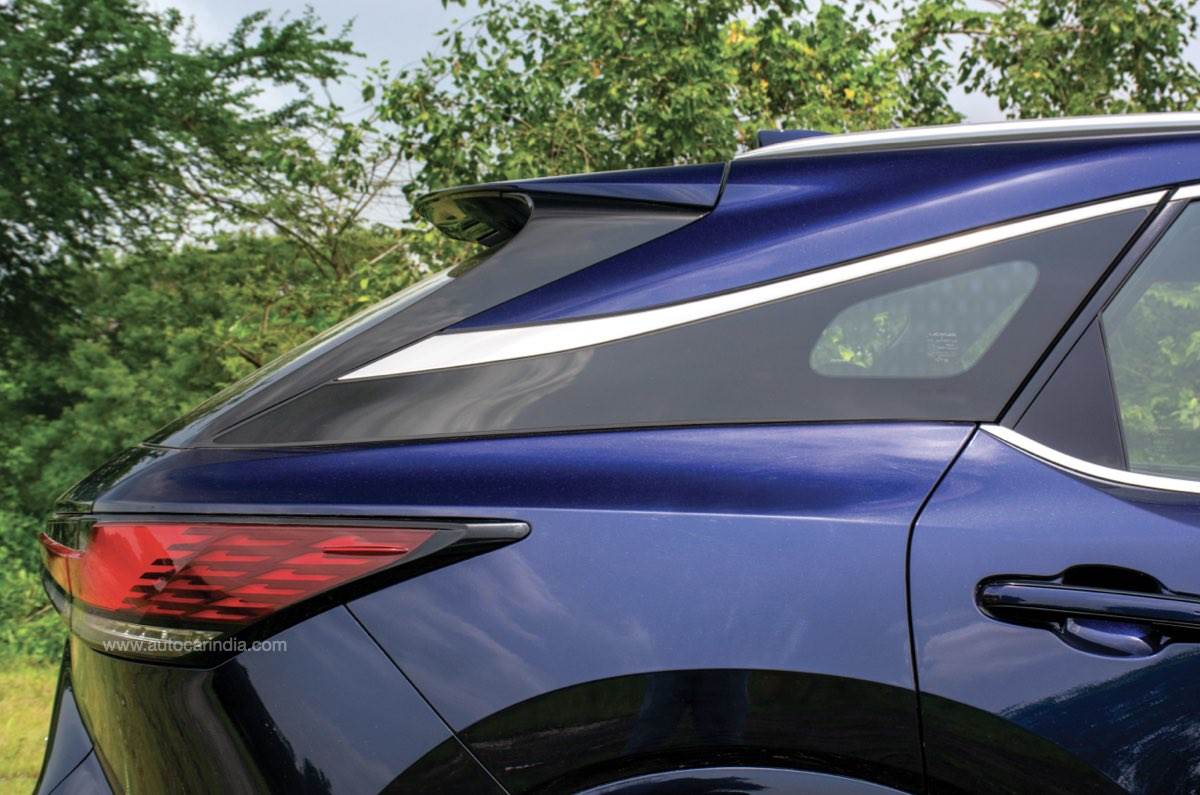 Floating rear pillar nicely done in flush-mounted glass.
Floating rear pillar nicely done in flush-mounted glass.Now in its fifth generation, the RX is built on Toyota’s GA-K or TNGA-K platform. Lighter by 90kg and with a centre of gravity that’s lowered by 15mm, the new RX is also built on a wider track and comes with a 2,850mm wheelbase. Marginally smaller than rivals like the Merc GLE and BMW X5, it is 4.9 metres long and 1.9 metres wide, and this 350h weighs in at around two tonnes. Other interesting chassis details include front fenders made of aluminium, a new type of hot-stamped steel is used on the B-pillars, and Lexus says it has created a rigid high-torsion body by using laser screw welding and structural adhesives.
When it comes to the suspension, the RX uses the time-tested setup of MacPherson struts up front and a multi-link rear. Lexus’s adaptive variable dampers are fitted as standard, but only the more expensive 500h gets rear-wheel steering. Braking, interestingly, is via an electronic ‘by-wire’ system, which on paper, helps blend braking via regeneration and the friction brakes more seamlessly.
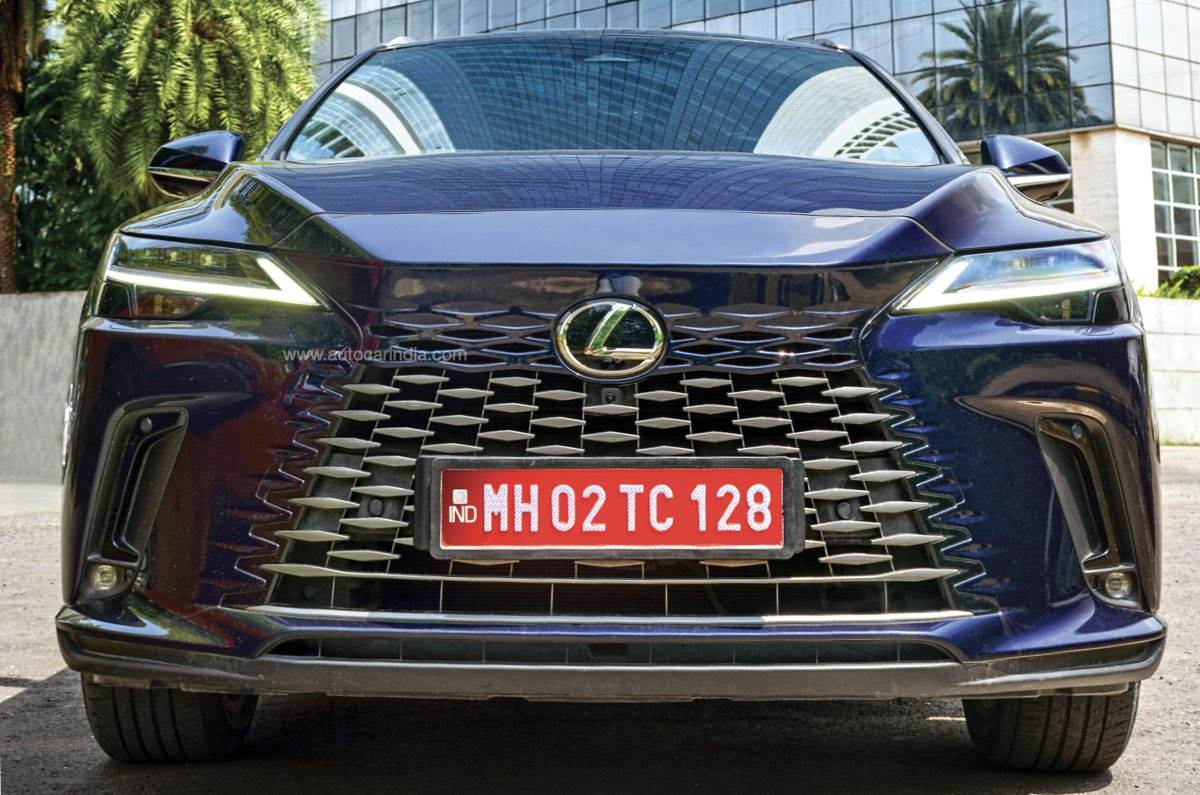
Under the hood, the hybrid system uses a 2.5-litre direct injection petrol engine with twin electric motors, one at each axle. Max combined power stands at 250hp. What helps give it a real kick is that the max torque from the front motor alone is 270Nm, and all of that torque goes to the front wheels as soon as the motor chimes in.
The batteries used for the hybrid system are new low-resistance nickel-metal-hydride drive battery carried under the rear seats. They are designed for fast charge and discharge, important as many earlier hybrids felt slow to react due to the laidback battery setup, that initially was tuned only with efficiency in mind.
Lexus RX Interior and features
Lexus, with the new RX, has clearly widened the definition of luxury beyond what we normally expect from European carmakers. There’s a material richness, tactile appeal and weighty perceived quality here that’s both very appealing but also quite different.
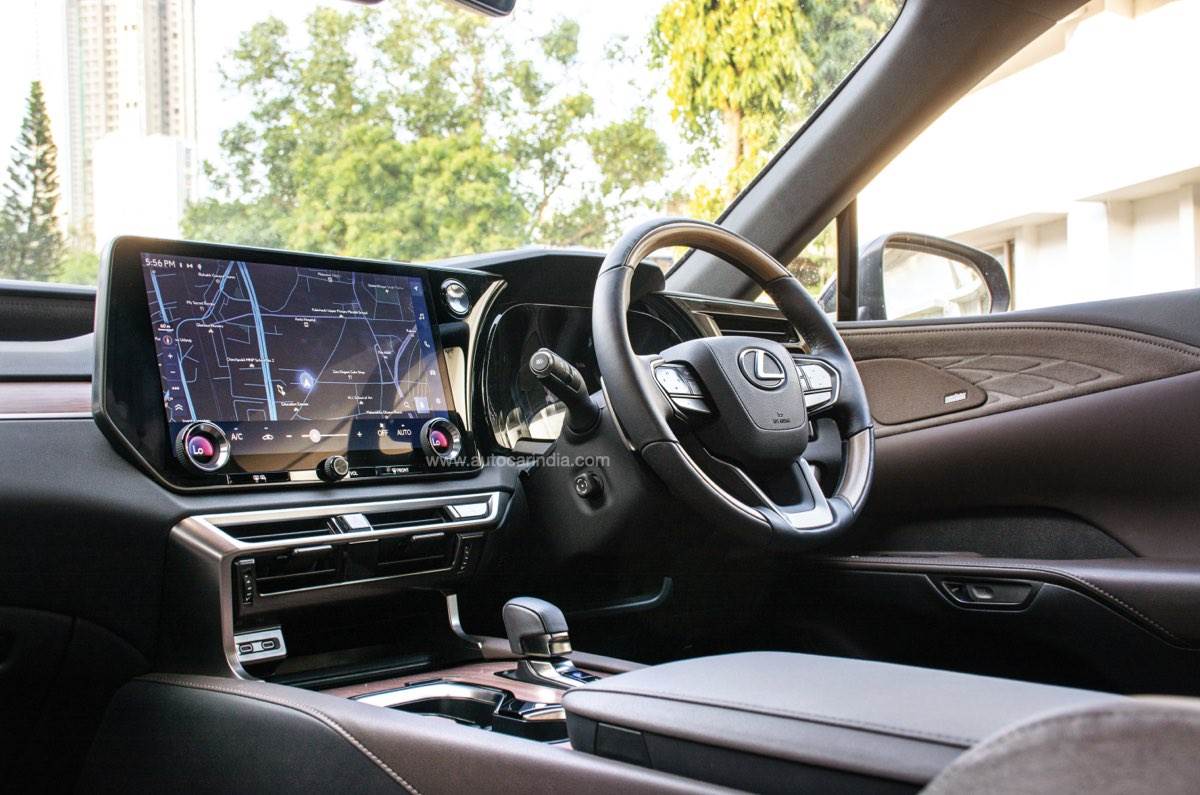
Big screen dominates cabin, is slick and easy to use.
A big 14-inch centre screen dominates the cabin. The quality, sharpness, colour balance and slick functionality of the screen make it feel like it is as good as an iPad, and what enhances the experience is that Lexus has also improved the user interface. ‘Improved’ is the key word here; it still isn’t perfect, but you aren’t searching for things endlessly, as was the case earlier.
Embedded in the lower part are beautifully made rotary temperature controls with screens in them that deliver a delightful tactile feel; I turn and twirl them just for the heck of it.
The big screen aside, the dash blends high-quality wood panelling and quality soft-touch leather, and a level of fit and finish earlier only seen on considerably more expensive products. There’s a generous but still tasteful use of piano black, the quality on the steering wheel is impressive and what really sets this cabin apart is the use of a thick gun-metal-like bracketing. It’s everywhere – around the vents, on the stubby gear lever, around the cup holders and then the buttons on the centre console are also built beautifully.
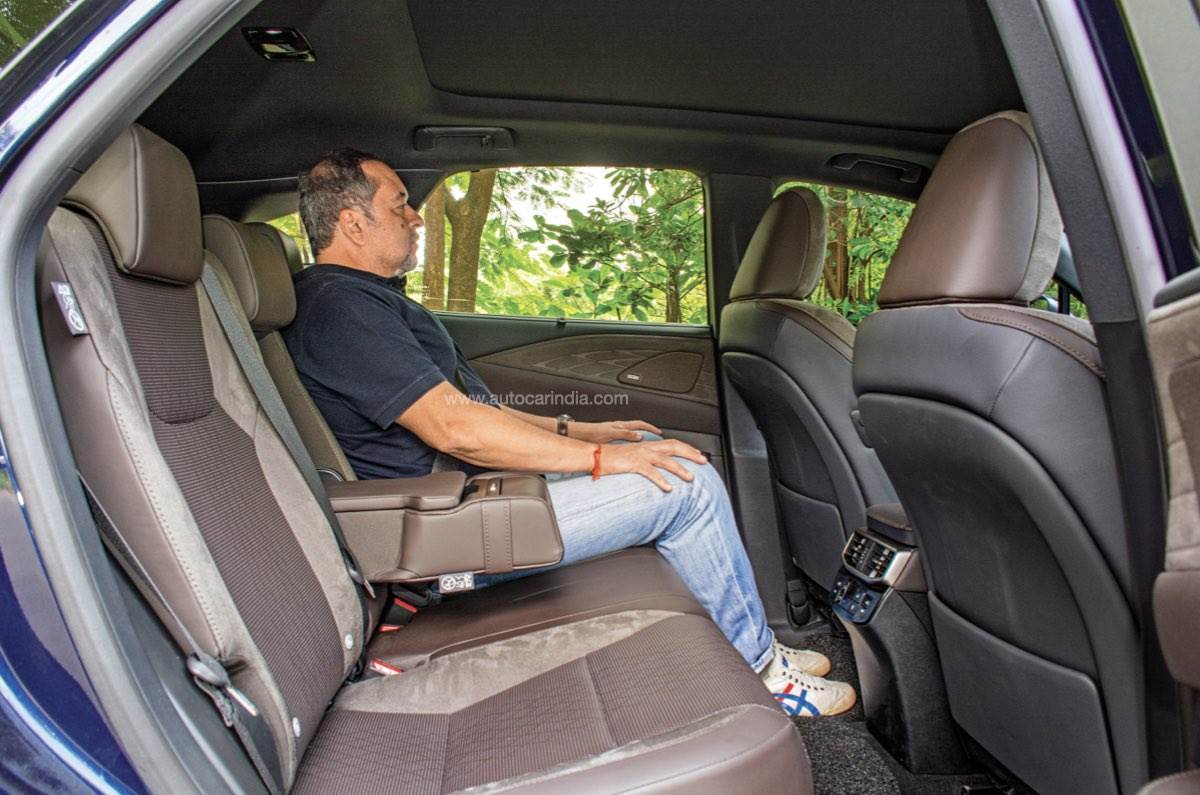
Plenty of space and comfort on big and airy rear seat.
Two unique, stand-out features are the electric e-latch door handles and the touch-control pads on the steering wheel. The former allows you to just press a button and open the door, and the touch controls on the thumb pads of the steering allow you to alter the menu for the heads-up display. The latter takes some getting used to but can be configured to even adjust temperature and fan speed, apart from stuff like media and volume control. As long you change modes when you are not on the move, the system works pretty well. When it comes to tech, Lexus’ system is fully connected and capable of over-the-air updates, and wireless Apple CarPlay works particularly well on the large screen; only Apple’s voice assistant Siri seems to have been deactivated.
Comfort levels are also top notch. The cabin, being of medium height, is easy to get into and the front seats are large and offer good lateral support. Built to suit American frames, like its other made-in-America rivals (yes, the GLE and X5 are both made in the US), there’s a good amount of shoulder room and headroom up front as well. The wide centre console does make the bottom half of the cabin feel a bit narrow though. The rear of the cabin, however, is wide and airy. The bench is big, it offers plenty of thigh support, the backrest reclines and what makes it feel even larger and more open is that the windows are large and you have a huge panoramic sunroof above.
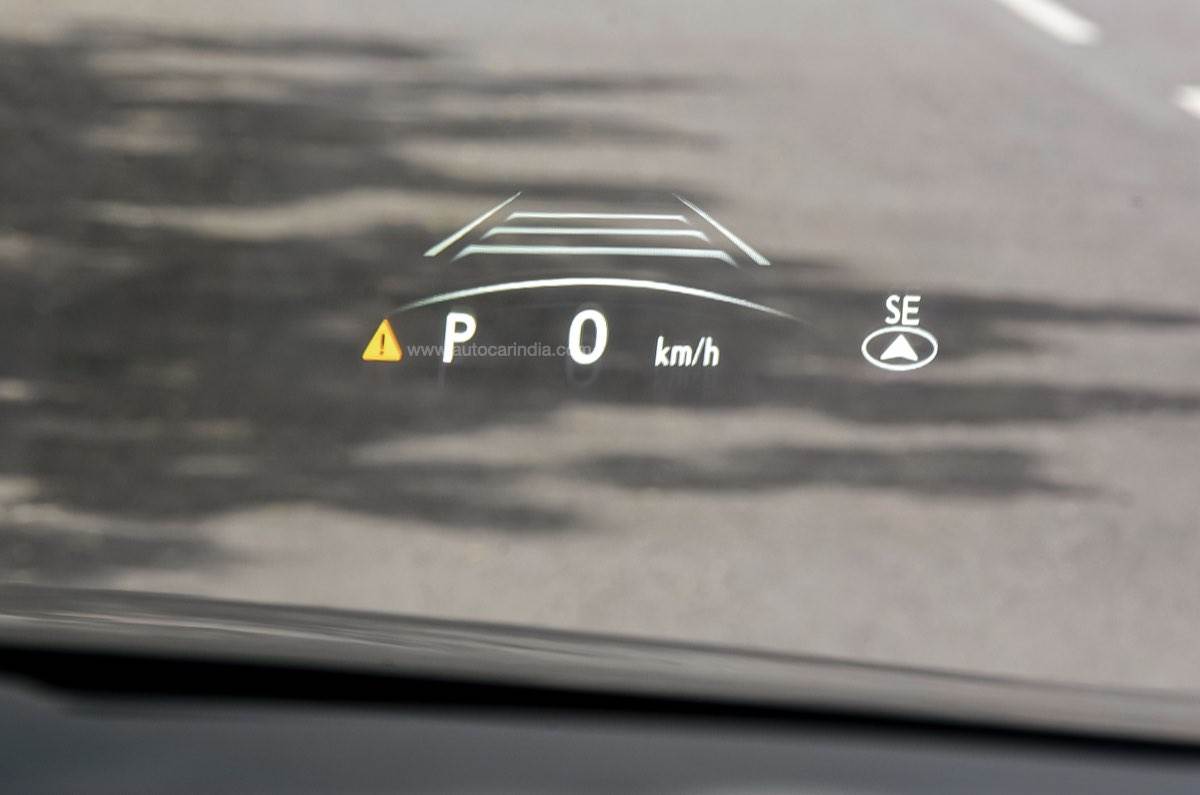
HUD can be configured via touch sensitive steering controls.
Safety kit includes dynamic radar-based cruise control, an anti-collision warning system and a safe door opening system, among others. This version of the RX also gets a brilliant 21-speaker Mark Levinson audio system, a panoramic view monitor that also delivers a ‘ghost-view’ and a 4X4 trail mode.
Lexus RX performance
Get behind the wheel and the Lexus RX 350h feels relaxed, laid-back and easygoing. This is because, like many strong hybrids, it does both response and instant torque delivery well. Put your foot down and it just goes; instantly. No delay, and with plenty of punch if you want. This, for the most part, is due to the big electric motor that sits on the front axle and delivers instant torque. Electric motors are quick to respond and unlike a conventional powertrain, there’s no waiting for the clutch to disengage and engage again, no delay in the gearbox swapping cogs, and no time spent waiting for the turbos to spool up.
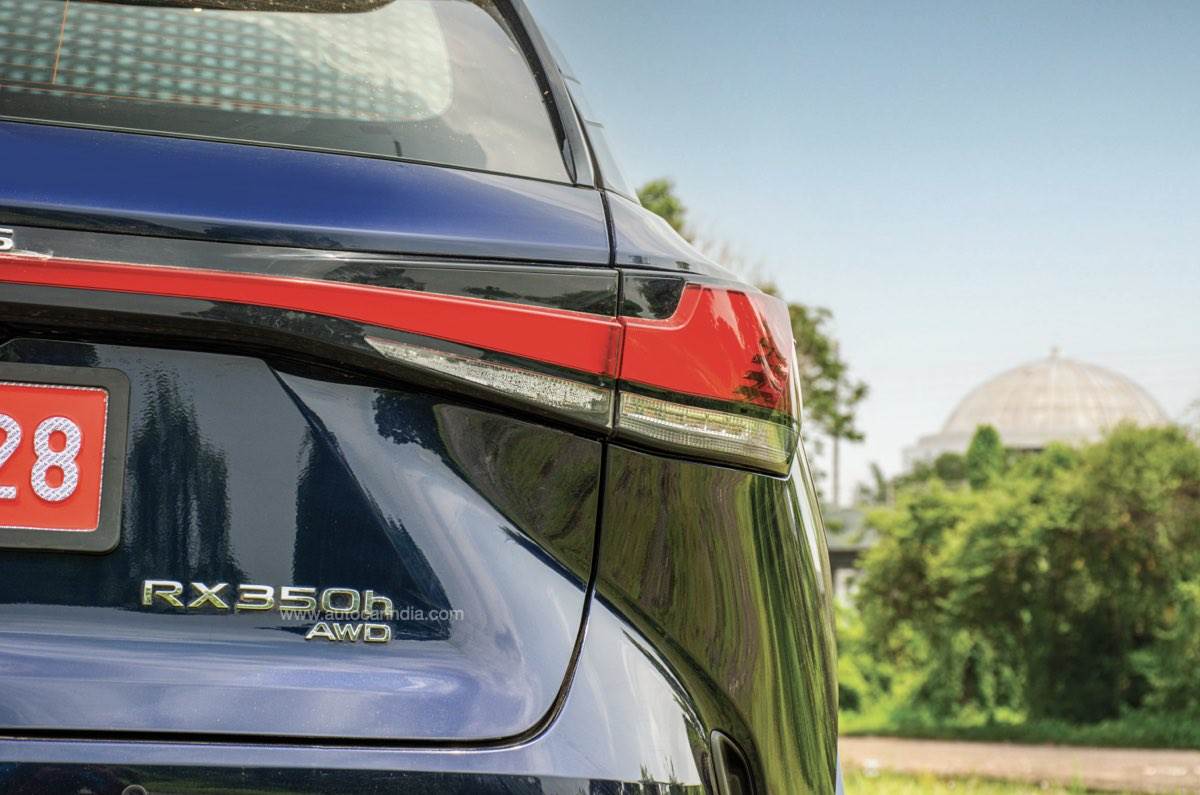
Strong-hybrid system has two electric motors, one on each axle.
Where the 350h is particularly nice is at part throttle and you get the distinct impression there’s a lot more in the pedal. This feels good when you want to overtake in a hurry, when you are cruising, and when using small throttle inputs to make up gaps in traffic.
Flat-out acceleration is disappointing for a car at this price. The 2.5-litre four-cylinder engine sounds strained, progress isn’t very good and that whole demeanour of effortless performance just dissolves when you go from part to full throttle. In fact, 0-100kph comes up in a long 7.9 seconds, and out on an open highway, it has nowhere near the grunt of, say, BMW’s diesel straight six. So, if you want to enjoy a drive in the RX, you just have to adopt a slightly laid-back driving style.
Lexus RX ride and handling
Lexus has always given comfort and isolation priority when it comes to ride quality. And even on our broken roads, the Lexus rides with enough suppleness, composure and body control to make any journey comfortable. Large and specifically deeper potholes do cause it to thud occasionally, and over really bad patches, it feels fidgety and body control isn’t great. What you can do, especially over lumpy patchwork roads, is select Sport, and then the dampers tighten up and restrict body movements quite successfully without making the ride too hard.
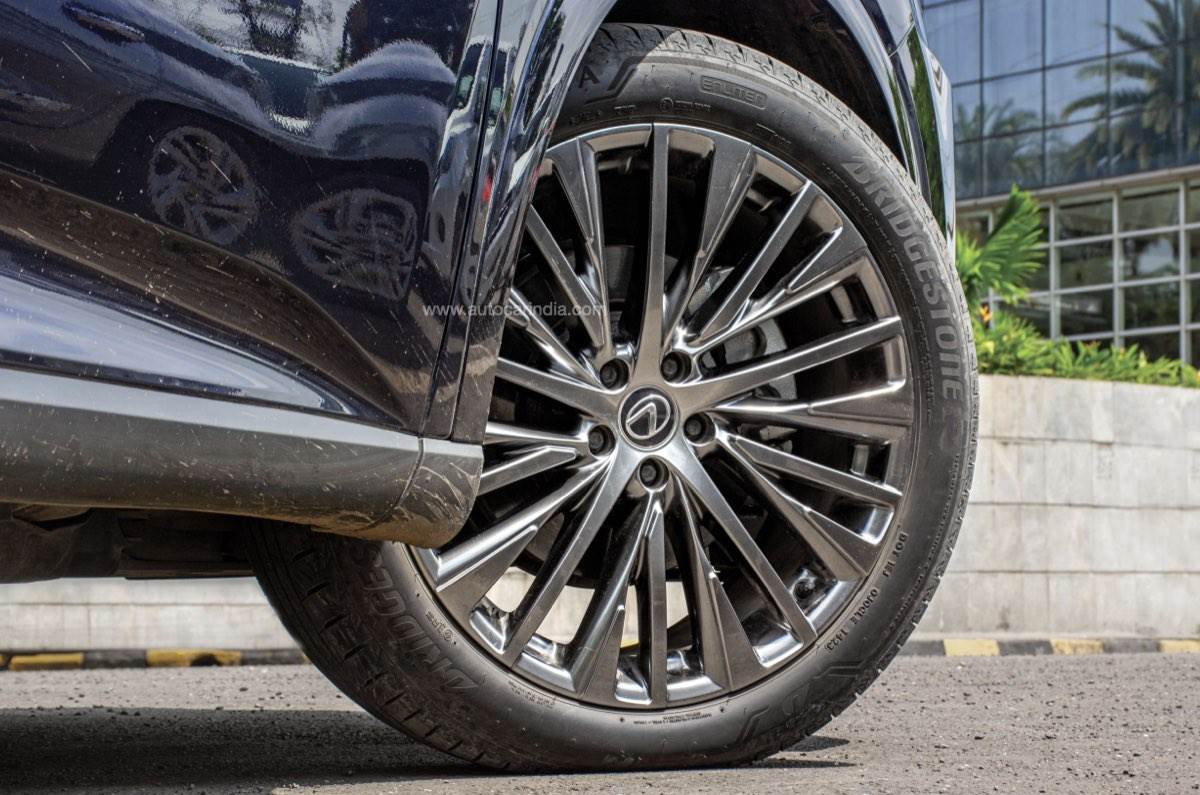
Ride is comfortable despite big, 21-inch wheels.
The RX also feels pleasantly agile. The steering is quick to respond and very accurate, and the suspension does a good job of controlling the rolling mass of the SUV. Maintain a ‘press-on’ but neat driving style with small inputs on the wheel and the Lexus can even help you enjoy a winding road. Where it really gives a good impression of itself, however, is in the cut and thrust of city traffic.
What also pleasantly surprised us was that despite all the hard driving and the incessant and near-constant use of more throttle than strictly necessary, the fuel gauge stubbornly refused to budge. So, like other strong hybrids, expect it to be 35 or even 40 percent more efficient than petrol rivals.
Lexus RX verdict
The Lexus RX 350h is a left-field answer to a question not many in India have been asking (but probably should). Original in its approach, near brilliant in execution, it takes on its well-entrenched rivals, but from a totally unexpected angle, offering a different but still very effective luxury experience.
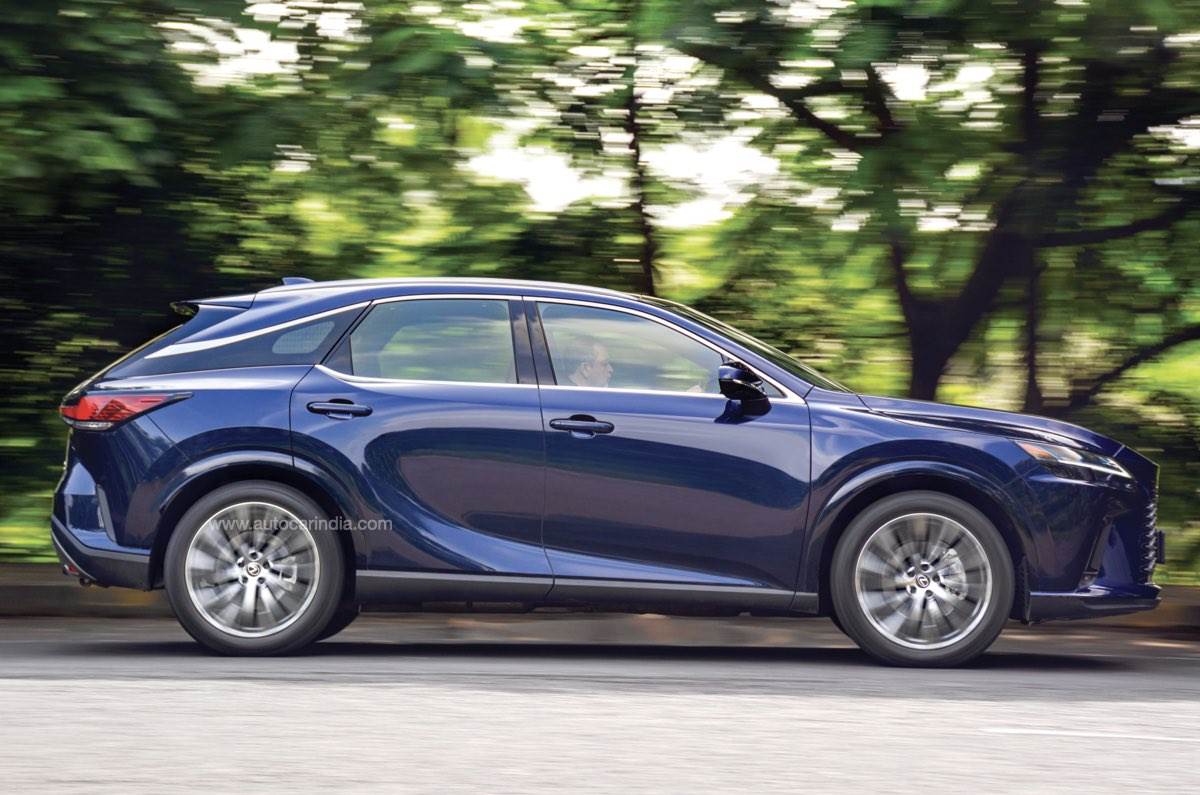
The RX is unlikely to start coughing up massive service and spare part bills in later years..
No, it isn’t particularly sporty – more power or a larger six-cylinder engine would have been nice – and it’s even less of an off-roader than its European rivals. The cabin, however, is extremely comfortable, well-equipped and now delivers a real high-quality vibe. It rides well on our roads, the hybrid powertrain feels potent unless you are going flat out and it feels pleasantly agile to drive in the city and around corners. .
Fuel economy is excellent and, importantly, it is unlikely to start coughing up massive service and spare part bills in later years. The Lexus RX is clearly not your mainstream luxury offering, it still feels expensive for what you get and it isn’t for everyone. What it does offer now, probably for the first time, is a credible alternative to more mainstream luxury SUVs from Mercedes, BMW, Audi, Range Rover and Volvo; one that also is greener, cleaner and is likely to have a lower real-world carbon footprint than even most electric SUVs. Something to ponder.
Also see
























